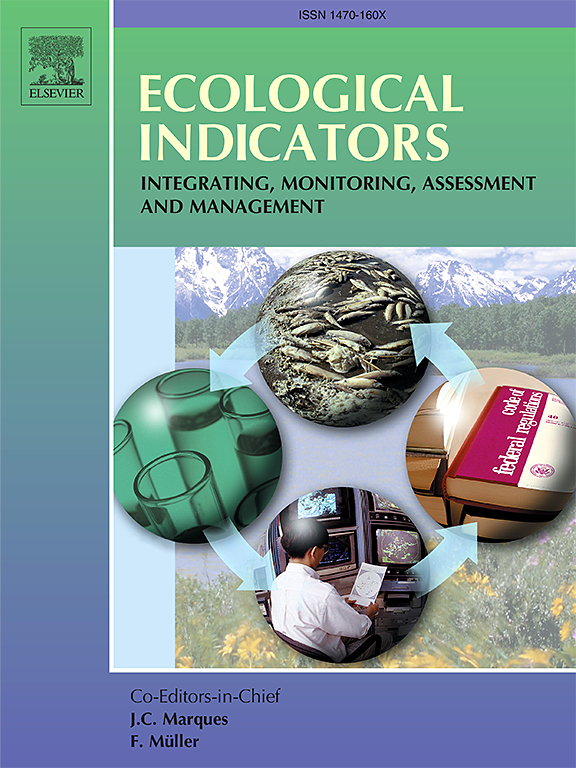A social-ecological-technological vulnerability approach for assessing urban hydrological risks
IF 7
2区 环境科学与生态学
Q1 ENVIRONMENTAL SCIENCES
引用次数: 0
Abstract
In the context of urban population growth and climate change, and ever greater number of people are anticipated to face severe risks associated with extreme climate events; major ones are due to stormwater-related hazards. This study offers novel understanding of the complex nature of water-related risks in urban geographies by employing a Social-Ecological-Technological Systems (SETS) framework to assess vulnerabilities. Hydrology-informed urban risk index was developed, quantifying seventeen indicators from historical and modeled data on sewer overflow and flood events. The spatially explicit SETS-based approach identifies high-risk communities and hotspots where multiple vulnerabilities intersect and can serve as a valuable tool for guiding policy and decision-making to support more resilient urban futures. Our findings reveal that social vulnerability plays a critical role in determining the overall risk (R = 0.4), with the greatest impacts imposed on socially vulnerable communities. However, insights from the ecological (R = 0.2) and technological (R = 0.1) domains provide essential guidance for future risk reduction strategies—such as upgrading outdated sewer infrastructure and exploring green space potential for run-off mitigation. The framework proposed is generalizable to other cities facing similar environmental challenges, highlighting its potential as a foundational tool for policymaking to reduce risks associated with extreme climate events.
城市水文风险评估的社会-生态-技术脆弱性方法
在城市人口增长和气候变化的背景下,越来越多的人预计将面临与极端气候事件相关的严重风险;主要是由于与暴雨有关的灾害。本研究通过采用社会-生态-技术系统(set)框架来评估脆弱性,对城市地区水相关风险的复杂性提供了新的认识。基于水文信息的城市风险指数被开发出来,从下水道溢流和洪水事件的历史数据和模型数据中量化了17个指标。基于sets的方法在空间上明确了多种脆弱性交叉的高风险社区和热点,可以作为指导政策和决策的宝贵工具,以支持更具弹性的城市未来。研究结果表明,社会脆弱性在总体风险中起着关键作用(R = 0.4),对社会脆弱性社区的影响最大。然而,来自生态(R = 0.2)和技术(R = 0.1)领域的见解为未来降低风险的战略提供了必要的指导,例如升级过时的下水道基础设施和探索减少径流的绿色空间潜力。提出的框架可以推广到其他面临类似环境挑战的城市,突出了其作为政策制定的基础工具的潜力,以减少与极端气候事件相关的风险。
本文章由计算机程序翻译,如有差异,请以英文原文为准。
求助全文
约1分钟内获得全文
求助全文
来源期刊

Ecological Indicators
环境科学-环境科学
CiteScore
11.80
自引率
8.70%
发文量
1163
审稿时长
78 days
期刊介绍:
The ultimate aim of Ecological Indicators is to integrate the monitoring and assessment of ecological and environmental indicators with management practices. The journal provides a forum for the discussion of the applied scientific development and review of traditional indicator approaches as well as for theoretical, modelling and quantitative applications such as index development. Research into the following areas will be published.
• All aspects of ecological and environmental indicators and indices.
• New indicators, and new approaches and methods for indicator development, testing and use.
• Development and modelling of indices, e.g. application of indicator suites across multiple scales and resources.
• Analysis and research of resource, system- and scale-specific indicators.
• Methods for integration of social and other valuation metrics for the production of scientifically rigorous and politically-relevant assessments using indicator-based monitoring and assessment programs.
• How research indicators can be transformed into direct application for management purposes.
• Broader assessment objectives and methods, e.g. biodiversity, biological integrity, and sustainability, through the use of indicators.
• Resource-specific indicators such as landscape, agroecosystems, forests, wetlands, etc.
 求助内容:
求助内容: 应助结果提醒方式:
应助结果提醒方式:


